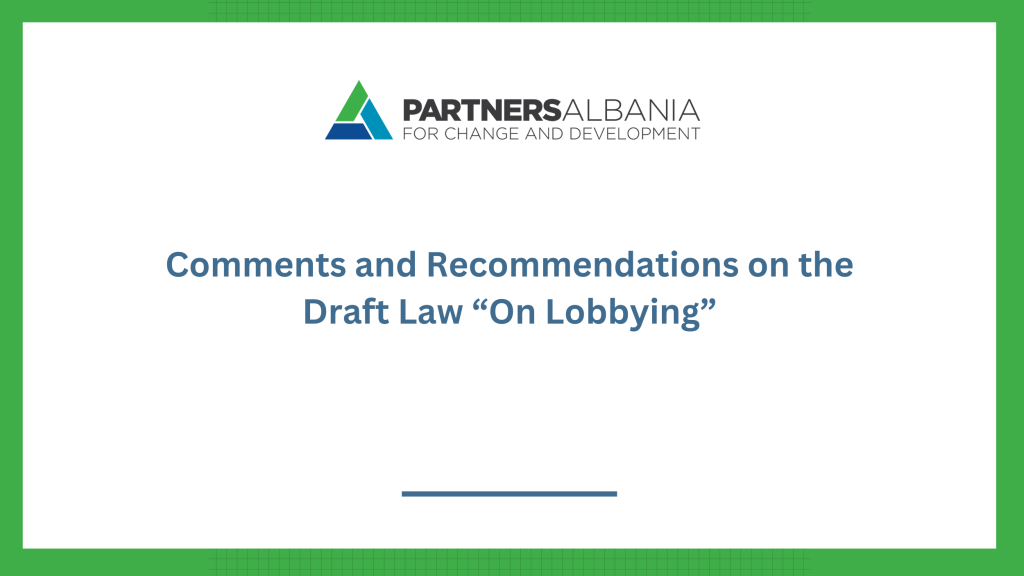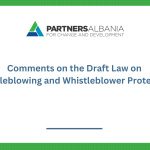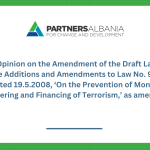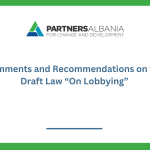Tirana, 14th November, 2025
Comments and recommendations on the draft law “On Lobbying”
- General Assessment of the Draft Law
In an overall assessment, the draft law “On Lobbying” represents a positive step toward establishing a legal framework aimed at enhancing transparency, integrity, and accountability in public decision-making processes in Albania. It affirms essential principles such as transparency, accountability, and integrity, seeking to limit hidden influences on public policy. However, the current formulation of the scope of application and the overly broad definition of “lobbying” create the risk that non-profit advocacy activities (carried out in the public interest) will be treated in the same way as commercial lobbying (conducted in a private interest). This lack of differentiation between public-interest and private-interest activity may impose a disproportionate burden on Civil Society Organisations (CSOs), which operate for the common good and not for economic gain.
International standards emphasise that the regulation of lobbying activities must ensure a fair balance between transparency and the safeguarding of democratic participation in public decision-making processes. According to Recommendation CM/Rec(2017) of the Committee of Ministers of the Council of Europe “Legal regulation of lobbying activities in the context of public decision-making”[1], Member States must ensure that legal rules on lobbying do not, in any form or manner, infringe upon the democratic rights of individuals to:
- a) express their views and submit requests, petitions, or proposals to officials, bodies, and public institutions, either individually or collectively;
- b) conduct campaigns for political, legal, policy, or practice changes, within the framework of lawful political activities, individually or collectively[2].
Similarly, the Organisation for Economic Co-operation and Development (OECD), in its official document “Recommendation of the Council on Principles for Transparency and Integrity in Lobbying” (first adopted in 2010 and updated in 2021)[3], stresses that rules and guidelines on lobbying must be clear, enforceable, and adapted to each country’s political, social, and administrative context. This standard calls for lobbying transparency measures to be balanced and proportionate to the aim of preventing undue influence, while upholding constitutional principles and established democratic practices. The OECD advises countries to assess the administrative burden created by lobbying regulations to ensure that they do not become a barrier to equal access for different groups to decision-making processes. In this context, the standards highlight the need for proportionality, clarity, and contextual alignment, so that strengthened transparency does not restrict the legitimate participation of public-interest groups in policymaking. Accordingly, legal regulation of lobbying should aim to prevent undue influence and strengthen transparency, without limiting lawful public-interest advocacy carried out for the common good.
Alignment with these principles would require the Albanian draft law to include explicit exemptions for CSO advocacy activities, to improve the definition of “lobbying,” and to ensure a proportional regulatory regime that does not discourage civil society participation. The OECD also notes that overly rigid or bureaucratic rules may create a “chilling effect”, discouraging citizens and nonprofit organisations from actively taking part in public debate and policymaking processes[4].
International experience reflects diverse approaches. Many countries have sought to balance transparency in decision-making with the protection of citizen participation. This effort is reflected in various national lobbying regulation models, each shaped by differing democratic traditions, levels of civil society development, and government priorities.
National models and approaches to regulating CSOs under lobbying laws differ widely. Each country applies its own standards and frameworks to determine transparency requirements and the role of CSOs in lobbying processes.
One group of countries, such as Croatia, the Czech Republic, and Cyprus, applies an inclusive model, explicitly covering nonprofit organisations within lobbying laws. These organisations are required to register and report their activities in the same manner as professional lobbyists. In some of these states, exceptions may exist for activities generally recognised as advocacy, such as media engagement, campaigns, or participation in policy discussions.
A second model is the exclusion-based approach. Countries such as Lithuania, Latvia, Slovenia, Australia, and North Macedonia follow this model. These states clearly distinguish between professional lobbying and public-interest advocacy, exempting nonprofit organisations from registration and reporting requirements. This approach supports the protection of the rights to public participate and freedom of expression, recognising civil society as a partner in policy development rather than an actor pursuing private financial gain.
A third regulatory form is the threshold-based model. This model is used in countries such as Austria, Ireland, Finland, Germany, and Scotland. These states establish clear thresholds, such as the number of contacts with public officials or the size of the organisation, to determine which entities fall within the scope of lobbying law. Organisations that do not exceed these thresholds are exempt from registration as lobbyists. This approach ensures proportionality, avoids unnecessary bureaucratic burdens, and does not hinder smaller organisations from participating in policymaking. These States also consider sector diversity in terms of size, activities, and scope. However, such systems can also increase regulatory complexity, as they often involve multiple actor categories subject to different reporting requirements. This may negatively affect transparency and undermine equal access, two of the key principles of effective lobbying regulation. Such systems have been criticised for creating an uneven playing field. When different disclosure requirements apply to different types of lobbyists, or when certain actors engaged in lobbying fall outside regulatory scope, loopholes emerge that may be exploited by corporate actors. “Astroturfing” refers to the practice of using NPOs as a façade to lobby for private interests, typically by large corporations. Companies may even create fictitious NPOs to give the impression of public support for a particular cause while concealing the real source of funding[5].
Some jurisdictions have gone even further in protecting public-interest advocacy. Slovenia exempts from lobbying rules the activities of individuals, informal groups, or interest groups when influencing decision-making on issues such as rule of law, democracy, and human rights protection. Through this approach, public-interest advocacy remains free from bureaucratic barriers and retains its operational freedom.
In this context, the experience of the European Union serves as an important point of reference. The EU Transparency Register[6], co-managed by the European Commission and the European Parliament, represents a consolidated model for ensuring transparency in interactions between “interest representatives” and public institutions. Registration is voluntary but operates under the “no registration–no access” principle, encouraging actors to publicly declare their interests, clients, and funding sources. The Register clearly distinguishes between professional lobbying and civic participation or public-interest advocacy, recognising the nonprofit nature of civil society organisations and avoiding unnecessary administrative burdens. This approach is widely regarded as an international good practice for balancing transparency and equal access to policymaking.
As highlighted above, the draft law “On Lobbying” is an important initiative for strengthening transparency, integrity, and accountability in public decision-making in Albania. However, the current provisions require improvement to ensure legal clarity, proportionality in implementation, and an appropriate balance between transparency goals and the right of civil society to participate actively in public decision-making. Applying a one-size-fits-all approach, without distinguishing between commercial lobbying and public-interest advocacy, may create unnecessary administrative burdens for CSOs and limit their role as legitimate actors in policymaking. Clearer definitions, explicit exemptions for public-interest advocacy, and the adaptation of reporting and oversight requirements to the nature, size, and real capacities of different entities would help establish a fairer, more workable legal framework consistent with the principle of proportionality[7].
As highlighted above, the draft law “On Lobbying” is an important initiative for strengthening transparency, integrity, and accountability in public decision-making in Albania. However, the current provisions require improvement to ensure legal clarity, proportionality in implementation, and an appropriate balance between transparency goals and the right of civil society to participate actively in public decision-making. Applying “a one-size-fits-all approach” without distinguishing between commercial lobbying and public-interest advocacy, may create unnecessary administrative burdens for CSOs and limit their role as legitimate actors in policymaking. Clearer definitions, explicit exemptions for public-interest advocacy, and the adaptation of reporting and oversight requirements to the nature, size, and real capacities of different entities would help establish a fairer, more workable legal framework consistent with the principle of proportionality.
- Article-by-Article Recommendations for Improving the Draft Law
The following section presents proposals for improving the provisions of the draft law, focused on articles that directly affect the activity of CSOs and their exercise of public-interest advocacy.
- In assessing Article 4 of the draft law, specifically the definitions in points 2 (“Lobbying”), 3 (“Lobbyist”), and 4 (“Beneficiary of lobbying”), it is evident that clarification and improvement are needed to more accurately define the scope of the law and the relationship between lobbying activities and public-interest advocacy carried out by CSOs. The current formulations are overly broad and inclusive, creating the risk that CSOs and their representatives may be treated as subjects of the lobbying law even when engaging in public-interest advocacy, without remuneration and in line with their statutory mission. Such interpretation could lead to misapplication of the law in practice, subjecting public-interest advocacy to the same legal regime as commercial lobbying activities. For example, Article 4, point 2 defines “Lobbying” as any activity undertaken with the aim of influencing public decision-making, legislative or policy-making processes, through any form of communication or formal or informal meetings with public officials, by natural or legal persons representing certain interests. This definition is excessively broad and captures any effort to influence public decision-making, without distinguishing between:
- lobbying activities conducted through contractual relationships or financial compensation, which are the intended subject of the draft law; and
- institutional communication activities conducted by non-profit organizations in the context of public-interest advocacy, in line with their statutory mission.
In the absence of such a distinction, any interaction between CSOs and public officials, including participation in consultations, submission of opinions or recommendations, or advocacy campaigns on public-interest issues, may be interpreted as lobbying. Such an interpretation could discourage CSOs and citizens from participating in public decision-making processes, creating a chilling effect on advocacy and public engagement.
Article 4, point 3, the definition of “lobbyist,” includes any natural person registered as a lobbyist and any legal person conducting lobbying through a registered lobbyist, who, in return for remuneration or “in direct interest,” undertakes activities aimed at influencing the drafting, adoption, amendment, or implementation of legislation, public policies, or administrative decisions through communication with public officials. This formulation, due to the expression “in direct interest,” is overly broad and may be interpreted as covering cases where CSOs conduct institutional communication or advocacy in line with their mission and statutory goals. Without a clear distinction between commercial lobbying and public-interest advocacy, directors, board members, employees, or experts of CSOs may be considered “lobbyists,” even though they do not engage in economic activity or seek personal gain.
Also, Article 4, point 4, also explicitly includes CSOs as “beneficiaries of lobbying,” without distinguishing between:
- cases where an organization undertakes public-interest advocacy in line with its statutory mission, conducted by its own representatives (directors, board members, staff, experts, etc.); and
- cases where an organization contracts an external lobbyist, for payment, to influence public decision-making on issues related to its own interests, its members’ interests, or those of a specific group it represents.
Without this distinction, any advocacy activity by a CSO that involves interaction with public officials may be interpreted as lobbying; any representative of the CSO as a “lobbyist”; and the organisation itself as a “lobbying beneficiary.” This is problematic, as CSOs in most cases act in the general public interest, without remuneration or economic gain, as part of their role in consultation and public participation processes.
To ensure legal clarity, proportionality in implementation, and alignment with the purpose of the law, it is recommended that the exemption for CSO advocacy activities be included in Article 3 “Scope of the law” through the addition of a new point (point 2), as follows:
“2. This law does not apply to institutional communication, public advocacy, and civic participation activities carried out by non-profit organisations on issues related to their statutory mission and objectives, when conducted independently, without remuneration, and in the general public interest.”
- Article 8 (Activities not considered lobbying)
Given the importance of this provision for the non-profit sector, several improvements are proposed:
- Definition of “structured lobbying relationships”: Article 8 uses the term “structured lobbying relationships” in letters (a), (c), and (dh) as a criterion to differentiate activities not considered lobbying. This term is not defined in Article 4, which may create implementation uncertainty.
- Participation in public consultations (letter b): Participation by anyone in an open public consultation process (e.g., submitting comments on a draft law or attending a public hearing) should not be considered lobbying, regardless of the participants’ funding sources. This is because the public consultation process is legally guaranteed as a right, and participation in it does not constitute lobbying activity. Conditioning participation on the existence or absence of a lobbying contract or payment introduces ambiguity and risks classifying legitimate activities as lobbying, even though they constitute the exercise of a lawful right to participate in policymaking. For example, a CSO implementing a donor-funded project to advocate for legislative improvements and submitting comments in the official consultation process is not conducting lobbying but exercising a lawful right to engage in policymaking. Therefore, it is recommended to remove the phrase “when there is no contract or payment for lobbying.”
- Public statements and positions of CSOs (letter ë): Article 8 letter ë stipulates “Public statements and positions of nonprofit organisations on matters directly related to their statutory mission and within their field of activity and expertise, as long as these are not financed or carried out with the specific purpose of lobbying on behalf of a third party.”
While intended to exempt CSOs, the current wording leaves room for divergent interpretations. The exclusion depends on three conditions: (i) “not financed,” (ii) “not carried out for a specific lobbying purpose,” and (iii) “on behalf of a third party”, which may create difficulties and practical challenges in implementation. Many CSOs operate with donor-funded public-interest projects (e.g., gender equality, environment, transparency, anti-corruption). Such funding does not constitute payment for lobbying yet may be misinterpreted in the absence of clear guidance. Uncertainty also arises regarding the meaning of “third party”: does it include donors funding advocacy initiatives, or only private actors benefiting directly from policy changes.
Without clarity, any public statement, awareness campaign, or advocacy activity aligned with a CSO’s mission may be classified as lobbying, imposing registration and reporting obligations and creating a chilling effect on public participation. To ensure legal clarity and a clear distinction between public-interest advocacy and commercial lobbying, it is proposed to reformulate letter “ë” of Article 8 as follows:
“Public statements, positions, campaigns, or other advocacy activities of nonprofit organisations that directly relate to their statutory mission and objectives and are conducted openly and transparently shall not be considered lobbying activities, provided that the organisation is not acting under a paid contract to represent the private interests of a third party.”
- Article 11 (Contents of the Lobbying Register): According to the point 3 of this Article, the Register is divided into a public part and a confidential part, with the latter including lobbying contracts and financial declarations. This provision restricts financial transparency in lobbying, as key information regarding compensation, lobbying expenses, and funding sources is not made available to the public. Such division reduces the effectiveness of the Register as a transparency and accountability tool. International standards require key financial data to be publicly verifiable, enabling citizens, media, and institutions to understand the financial influences on public decision-making. Such transparency ensures compliance with the principle of openness embedded in the law and allows the public to know “who pays whom” in lobbying processes.
- Article 21 (Declaration of financial resources and lobbying expenses): Article 21 requires registered lobbyists to submit semi-annual financial declarations to the Commissioner for the Right to Information and Personal Data Protection, including sources of funding, expenses, and contacts with public officials. The article specifies basic elements of the declaration, while the form and submission procedure are to be regulated by the Commissioner. However, the draft law does not specify the starting point of the reporting period for newly registered entities, which may result in implementation difficulties and unjustified penalties. The article also does not address self-lobbying, where a natural or legal person interacts with public institutions to influence decisions in their own direct interest, without third-party contracts or financial compensation, cases that should reasonably be excluded from reporting obligations. Another concern is that semi-annual reporting may impose a disproportionate administrative burden on smaller entities with limited staff and modest budgets. As Transparency International[8] notes, such obligations may create a chilling effect on public participation and civic advocacy due to fear of sanctions and bureaucratic load.
- Article 25 (Supervisory activity of the authority responsible for lobbying): Article 25 outlines how the Commissioner for the Right to Information and Personal Data Protection is to exercise its supervisory and oversight functions as the authority responsible for enforcing the lobbying law. While the article clearly identifies the Commissioner’s monitoring role, it lacks procedural provisions that define how inspections are conducted and what procedural safeguards apply to the entities subject to oversight. The article does not specify whether the Commissioner must notify the entity in advance, whether the entity has the right to submit explanations or counter-evidence, or how the inspection findings are to be recorded. Moreover, in carrying out supervisory activities, the Commissioner may access financial records, contractual documents, and other sensitive information, potentially containing personal data, trade secrets, or confidential material. The article provides no reference to compliance with personal data protection legislation, trade secret rules, or classified information requirements, even though these safeguards are essential to ensuring a proper balance between transparency and the protection of sensitive data. A further gap is the absence of any reference to the Code of Administrative Procedures, which requires that administrative inspections respect the principles of prior notification, the right to be heard, proportionality, and reasoned decision-making.
- Article 27 (Transparency, control, and management of reports on lobbying activities): Article 27 requires public officials to report any contact with a lobbyist within 15 days, creating a clear asymmetry with lobbyists’ semi-annual reporting obligations. This mismatch may lead to information gaps and complications in cross-checking data, especially in the absence of a mechanism to compare the two sets of reports.
The law does not provide for an integrated registry or electronic system to automatically cross-reference declarations from lobbyists and public officials.
Moreover, no procedures are defined for correcting errors or appealing inaccurate disclosures. The 15-day reporting obligation may be difficult for public officials to comply with, especially those who interact frequently with stakeholders during consultations or hearings. Without an automated electronic platform, the obligation risks becoming a bureaucratic burden, producing formal rather than meaningful transparency.
Finally, if a CSO is registered as a “lobbyist,” every contact it has with MPs, ministers, or local officials, even in the course of legitimate advocacy, would require a formal report from the public official. This would discourage public officials from engaging with civil society and create a chilling effect on participation and public dialogue.
- Article 28 (Administrative sanctions): The draft law sets high fines and bans of up to three years, without distinguishing between serious and minor violations. This contradicts the principle of proportionality and may result in excessive penalties for low-impact actors. It is recommended that administrative measures be graduated, starting with warnings and corrective deadlines before imposing fines.
This document was prepared by:
- Partners Albania for Change and Development
- Institute for Cooperation and Development
- European Movement in Albania
- Initiative for Social Change – ARSIS
- A.L.T.R.I. Center
- Center Science and Innovation for Development (SCiDEV)
- Gender Alliance for Development Center
[1] Council of Europe, Committee of Ministers, Recommendation CM/Rec(2017)2 “On the Legal Regulation of Lobbying Activities in the Context of Public Decision-Making”, Strasbourg, 22 March 2017, https://rm.coe.int/0900001680700a40
[2] Ibid, paragraph C.4 of Recommendation
[3] OECD, Recommendation of the Council on Principles for Transparency and Integrity in Lobbying, Annex – Principles, Principle 2, Paris: OECD Publishing, 2021, p. 4, https://vtek.lt/wp-content/uploads/2021/05/OECD_Recommendation-of-the-Council-on-Principles-for-Transparency-and-Integrity-in-Lobbying.pdf
[4] https://knowledgehub.transparency.org/assets/uploads/helpdesk/Lobbying-regulations-and-CSOs_2023_PR.pdf
[5] https://knowledgehub.transparency.org/assets/uploads/helpdesk/Lobbying-regulations-and-CSOs_2023_PR.pdf, page 7.
[6] https://transparency-register.europa.eu/index_en
[7] European Commission (2021), Interinstitutional Agreement between the European Parliament, the Council of the European Union and the European Commission on a mandatory Transparency Register, https://eur-lex.europa.eu/eli/agree_interinstit/2021/611/oj/eng
[8] https://knowledgehub.transparency.org/assets/uploads/helpdesk/Lobbying-regulations-and-CSOs_2023_PR.pd






